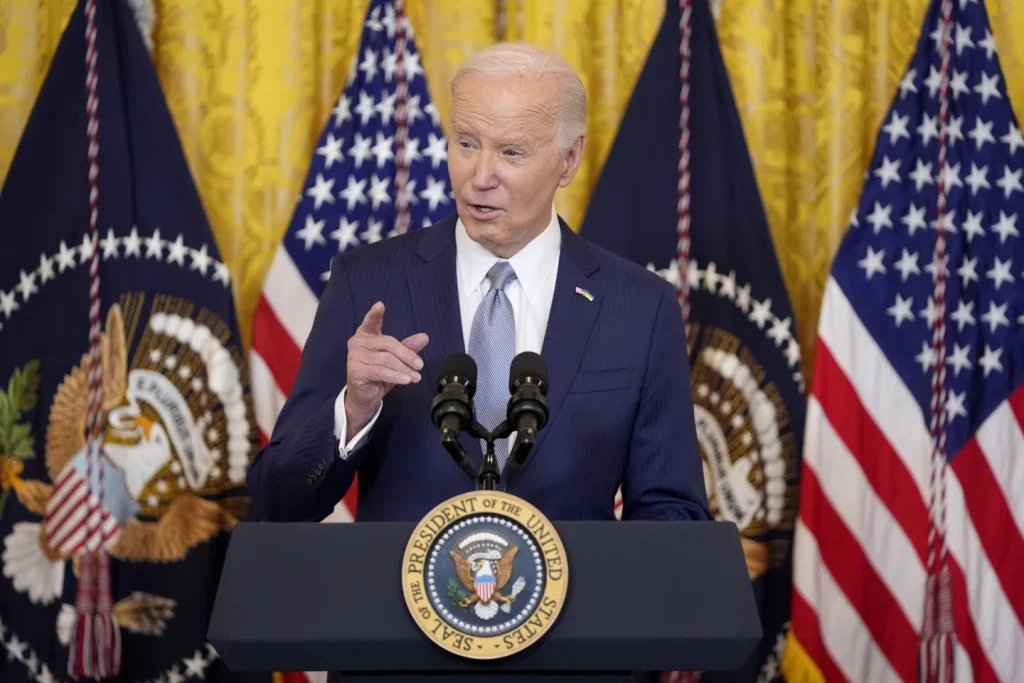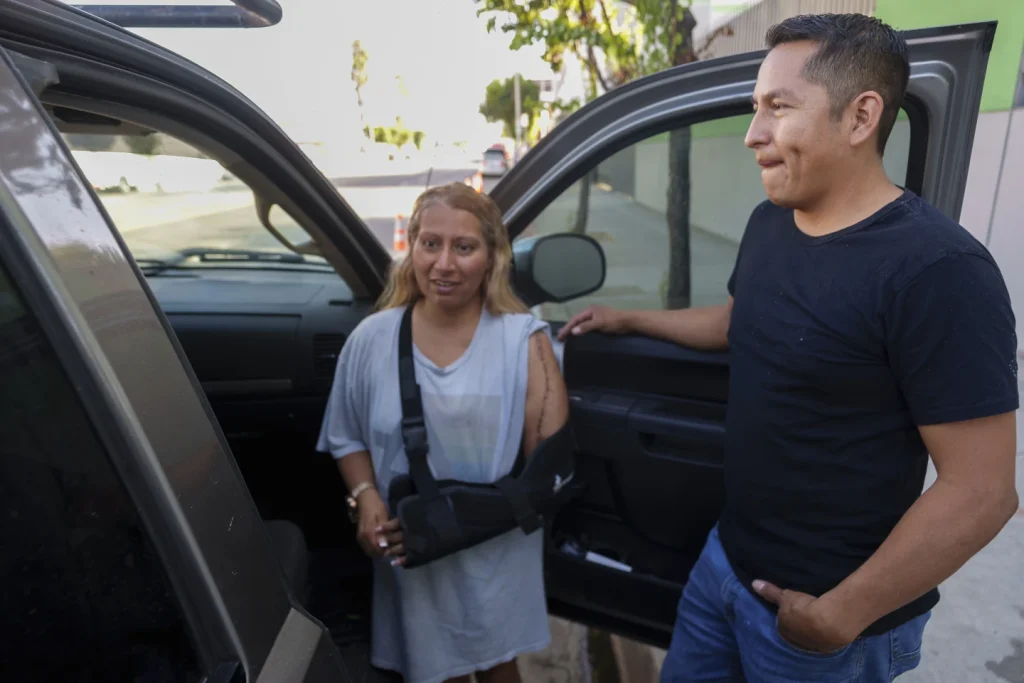In the rapidly evolving landscape of American immigration policy, recent developments surrounding President Joe Biden’s “Keeping Families Together” program exemplify the intersection of legal, social, and political dynamics.
The program, which emerged as a beacon of hope for countless families entangled in the complexities of immigration law, faced an abrupt halt due to a federal judge’s temporary suspension.
This decision not only disrupts the lives of individuals like Oscar Silva but also raises critical questions concerning judicial influence, the legislative process, and the broader implications for the immigrant community in the United States.
Oscar Silva, a 23-year-old college student who arrived in the United States as an infant, embodies the dual narrative of hope and uncertainty that millions of immigrant families contend with.
Silva’s excitement upon receiving an appointment for a biometric exam—an essential step in the newly announced citizenship pathway for spouses of American citizens—was short-lived due to the ruling of U.S. District Judge J. Campbell Barker.
The temporary suspension of the program, which aims to ease citizenship pathways for an estimated 500,000 immigrants, signals a significant setback for families seeking stability and unity amid a historically contentious immigration landscape.
The backdrop to this judicial intervention is a concerted effort by 16 states, led by Republican attorneys general, who contended that the Biden administration’s program overstepped its bounds by circumventing Congress.
They posited that such actions could lead to “irreparable harm,” invoking concerns surrounding governance and the rule of law. This perspective underscores a broader political narrative, where immigration policy continues to serve as a flashpoint for partisan division.
Republican Texas Attorney General Ken Paxton’s commendation of the judge’s ruling epitomizes the ongoing struggle between state and federal authority regarding immigration enforcement and policy formulation.
Nevertheless, the ramifications of Barker’s order extend far beyond political theater; they directly impact the lives of real families navigating a labyrinthine immigration system.
Couples like Oscar and Natalie Silva find themselves ensnared in a state of limbo, grappling with heightened anxiety over their future.
The prospect of separation and the potential requirement for spouses to return to their home country—often for extended periods, they may never return—yields a profound emotional toll.
Such uncertainties exacerbate the existing challenges faced by immigrants, reinforcing a narrative of fear and instability.
Silva’s poignant reflections—“I feel pretty heartbroken, very sad… because without it we face so much uncertainty”—serve as a stark reminder of the human costs associated with immigration policy.
The temporary nature of Judge Barker’s order, categorized as an administrative stay, does little to quell the turmoil within the immigrant community.
While the Department of Homeland Security (DHS) announced its intention to continue accepting applications and defend the program in court, the immediate impact on applicants remains unclear.
Immigration attorney Laura Flores-Perilla highlighted the uncertainty surrounding appointment scheduling and case outcomes, suggesting that the legal landscape is shifting rapidly and unpredictably.
The implications of this judicial suspension extend beyond the immediate concerns of those directly affected. Legal practitioners, advocacy groups, and policy analysts are confronted with the need to navigate an increasingly convoluted and fluid immigration landscape.
Gregory Chen, the director of government relations for the American Immigration Lawyers Association, reported a surge in inquiries from legal professionals seeking clarity about the implications of the court’s ruling.
This surge reflects a broader pattern of confusion and apprehension that characterizes the current immigration policy environment.
In light of these developments, it is imperative to reconsider the role of judicial intervention in shaping immigration policy.
The Baldwin administration’s initiatives, particularly those designed to unify families and mitigate the adversities faced by undocumented spouses, reflect a tangible shift towards a more empathetic immigration framework.
However, when such initiatives are met with judicial roadblocks, the potential for meaningful reform is diminished.
The ongoing litigation surrounding the Keeping Families Together program, coupled with the daunting political climate, raises questions about the sustainability of immigration reform efforts under judicial scrutiny.
The emotional and psychological impacts on families like the Silvas showcase the real-world consequences of these legal disputes.
Couples face heart-wrenching decisions about whether to pursue applications under a cloud of uncertainty, weighing the risks of potential separation against their dreams of a coherent family unit.
Advocacy groups and legal organizations must now rally to provide support, guidance, and resources to those navigating this precarious situation.
In recent developments regarding immigration initiatives, a notable organization has proactively conducted three webinars aimed at equipping legal practitioners with comprehensive knowledge about a specific parole program; one of these webinars remarkably attracted approximately 1,000 lawyers, a testament to the growing interest and need for education on such critical issues, as highlighted by program spokesperson Chen.
Among those seeking clarity and assistance within this complex landscape are Roberto García, 37, and his wife Maria, residents of Los Angeles, who recently invested $3,000 to engage an attorney for assistance in navigating the intricate and often daunting application process associated with the said program.
Regrettably, their efforts have been impeded by a recent judicial order that has temporarily halted the submission of applications, leaving numerous families like the Garcías in a state of uncertainty regarding their futures.
Confronted with this unexpected setback, Roberto Garcia, the sole provider for his family of five, expressed his dismay and frustration, articulating the emotional toll that such abrupt changes inflict on individuals striving for a better life—”I didn’t think this was going to happen.
It’s very hard,” he lamented, underscoring the feeling of being relegated to a lower priority in a system that seems to wield power over personal aspirations without regard for the families affected.
As the Garcías aspire to achieve permanent residency, which, if granted, would afford them a three-year period during which they could apply for work authorization, Maria García has begun to lose hope, reflecting on the possibility of relocating to Mexico in search of a more stable existence near her husband’s family.

“We will never be able to buy a house here,” she poignantly remarked, conveying the frustration that arises from a perceived injustice where compliance with legal frameworks appears to yield punitive consequences, while contrary actions seem to go unchallenged, thereby questioning the very foundations of fairness and opportunity in their pursuit of the American Dream.
In conclusion, the temporary suspension of President Biden’s “Keeping Families Together” program illustrates the profound implications of judicial decisions on immigration policy and family unity.
As individuals like Oscar Silva confront an uncertain future, the need for a comprehensive approach to immigration reform becomes increasingly urgent.
Policymakers must grapple with the complexities of the legal system while striving to create pathways that prioritize family reunification and humanitarian considerations.
The limit of the law must not overshadow the lived experiences of those it governs, reminding us all of our shared humanity in the face of systemic challenges.
Ultimately, the aspiration for a more just and equitable immigration system does not rest merely in legal frameworks but in the recognition of the dignity of those who seek a place to call home.
